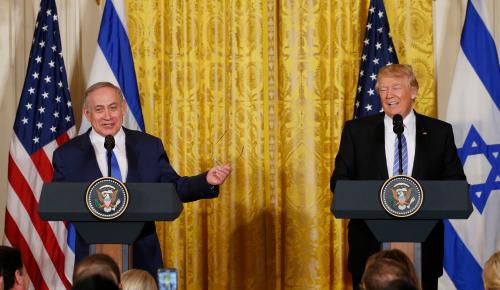A Hebrew translation of this post, written by Michal Aharoni, is available here.
In a lengthy forum convened by Brookings’s Center for Middle East Policy, a man who wants to be Israel’s next prime minister laid out what he termed a “new paradigm” for his country’s economic and security policy. Erel Margalit, a successful entrepreneur turned politician, laid out an ambitious blueprint based on “converging interests” at home and abroad.
At home, Margalit argued, Israel needs a coordinated effort to extend economic development to its long-neglected northern and southern peripheries. This effort would involve private capital as well as public policy. Not only would this enhance his country’s economic dynamism, but also it would open up opportunities for its non-Jewish minorities, helping to build a more inclusive society.
Abroad, Margalit stressed, Israel must adopt a regional strategy based on the interests it shares with many Arab states—in particular, countering Iranian influence and reducing the threat of what he termed “fundamentalist extremist groups,” especially ISIS, al-Qaida, and the militant wing of Hamas. Iran, he said, “is a nuclear threshold country and a state sponsor of terror, and is now positioned to receive an influx of foreign investment that will transform it into an economic superpower.” The rise of fundamentalist extremism among the Arab world’s growing youth population in part reflects its lack of jobs and expectations for a better future. Cooperation on regional security and major development projects, including water and basic infrastructure, could mitigate these threats.
Although Margalit did not name specific countries or groups, he said that he has presented his blueprint to a number of high-level Arab audiences and has received a broadly favorable response.
The Palestinian question
Regarding bilateral Israeli-Palestinian relations, Margalit advocates a more familiar approach based on six principles:
- A declaration by the leadership on both sides that they remain committed to a two-state solution;
- An exchange of territories;
A demilitarized Palestinian state with a long-term but time-limited Israeli security border along the Jordan River;
A Palestinian right of return to the Palestinian state, with reparations and compensation from a fund supported by the international community;
The preservation of current “large settlements blocs,” so that most Israelis now living across the Green Line would remain under Israeli sovereignty; and
A “creative solution” in Jerusalem that would fully respect the three religions and their holy sites.
Margalit resisted suggestions that successful Israeli-Palestinian talks supported by the United States would have to await the creation of new regional alliances. Instead, he said, these efforts should proceed in parallel. But they are related nonetheless. To negotiate successfully, he insisted, “people need to believe in your intentions,” and inclusive development efforts within Israel as well as regionally would bolster Israel’s credibility.
The alternative at home and abroad, [Margalit] insisted, is to unite reasonable forces against the extremists.
Politicking and more
Responding to questions about the domestic political requirement for implementing his plan, Margalit was blunt. First, he will work for a “New Labor” party that is both credible on security issues and open to market-based economic strategy. Economic gains in the famous “startup nation” have this far been confined to the top one-third of the population in Israel, while the remaining two-thirds have been left behind. “Old Labor’s” instinctive response is to bring the one-third down; Margalit’s is to bring the two-thirds up. Old Labor’s focus on social justice, he said, is valid but insufficient; instead, the center-left should embrace policies that promise economic gains for every sector of society.
Margalit acknowledged that the reform of his own party will not be enough: once Labor “get[s] its act together,” he said, it will be in a position to execute a merger-and-acquisition strategy. In addition to the centrist Yesh Atid party, the new center-right Kulanu party is a possible partner in a future center-left/center-right coalition. In addition, former defense Minister Moshe Ya’alon, who recently resigned in a noisy dispute with Prime Minister Netanyahu, seems to be preparing the ground for a new center-right appeal to long-time Likud members disillusioned by Netanyahu’s hard tack to the right. Despite his reputation as a hard-liner, Margalit said, “Ya’alon is moving toward us, and we can meet him halfway.”
Margalit offered a tough critique of Netanyahu’s policies, which have left Israel in an economic and security “bunker.” The alternative at home and abroad, he insisted, is to unite reasonable forces against the extremists. He asked: When has Israel ever gained from making itself a stationary defensive target? Instead, his country must regain the offensive, and that means bold policies reflecting the experiences of a new generation.
Margalit is already regarded as one of the top three candidates for the leadership of the Labor Party, renamed the Zionist Union before the past election. To win the leadership, he will have to persuade his party’s rank and file that it is time for a fundamental change, as Third Way insurgents in other countries did in the 1990s.







Commentary
Could this man bring the next big shake-up to Israeli politics?
September 14, 2016